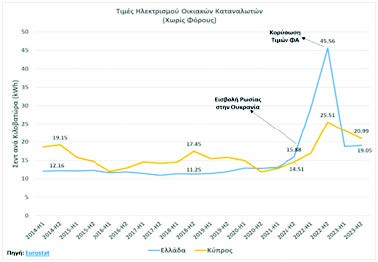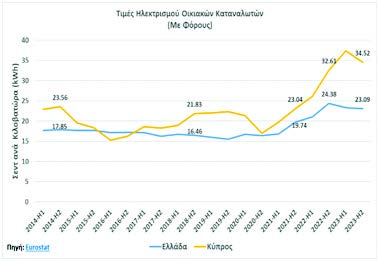Filenews 2 June 2024 - by Chrysanthos Manoli
At €18 billion. The cost of Cyprus' green transition – Better management of existing resources is needed to reduce the burden on households and businesses
We could ask twice or three times as many questions to the former Energy Minister, even on the burning topical issues. This interview was scheduled well in advance and it was Insider's choice to listen to George Lakkotrypis' positions on broader economic issues, which of course are increasingly closely linked, everywhere in the world, to key energy issues and the Green Transition.
SATISFACTORY EXISTING RESOURCES
There is a big debate, everywhere in the EU, about the Union's goals for the green transition and the costs to European societies and economies. We originally said, "No matter what it costs, we need to decarbonize energy and transportation to save the planet." Now, however, the green transition seems to be directly linked to phenomena of inflation, high prices for products and services, gradual deindustrialization of EU countries and falling living standards for large masses. Could the green transition have been less painful for European citizens? Can the EU change course today?
You began our debate with one of the most difficult questions plaguing the EU that could consume all our discussion. In other words, how to strike a balance between the short-term needs and quality of life of the citizens of the Union, versus the long-term protection of the planet, for the benefit of future generations.
We are already burdening our children and our children's children with the repayment of astronomical debts, which for the EU-27, at the end of 2023, amounted to close to €14 trillion. The least we owe them is to find that balance.
To meet the 2030 targets, some studies put the cost of green infrastructure in Europe at €800 billion. and at €2.5 trillion. to complete the Green Transition by 2050. For Cyprus, the "Energy and Climate Plan 2030" foresees that in order to reach the national targets, approximately €18 billion will need to be spent, of which the largest percentage concerns transport.
The question is therefore imperative: how do we finance the urgent Green Transition without overburdening future generations or bankrupting our states, while at the same time protecting struggling citizens from the dramatically increased cost of living?
I believe that the answer lies in optimising the allocation of existing resources to consumers and businesses. I stress the word 'existing' because the resources currently available are by no means insignificant.
For example, in Cyprus, the state has three main sources of revenue related to the Green Transition.
The first is the RES/EE Fund, which is financed by the excise tax of €0.005 per kilowatt hour (half a cent/kWh) on electricity bills and by RES contracts, which in some periods (such as today) are credit to the Fund and in others are debit. The revenues from the Fund are allocated entirely to the Green Transition and are essentially the main reason why, by the end of 2023, more than 50,000 households or 10% of the total have installed a photovoltaic system on their roof and have achieved significant savings in electricity costs.
The second source is European programmes, such as REPowerEU and the Innovation Fund, which come to support private initiative, especially in innovative solutions such as Carbon Capture and Storage. In 2023, these programmes helped the EU-27 increase new solar installations by 40% compared to the previous year. According to data from CERA and TSOC, in Cyprus the rate of increase reached 83% (in 2023 207 MW of solar capacity was added, compared to 113 MW in 2022), mainly due to the completion of licensed commercial parks and the increase in residential installations through Net-Metering. The EU should allocate more resources from such programmes to support the green path, but without derailing national economies and pushing the cost of living even higher.
The third source of revenue for Member States is revenue from emission allowances, which consumers actually pay through their electricity bills. It is noteworthy that, in Cyprus, no part of these revenues is returned to the market in the form of sponsorship schemes to support the Green Transition.
For example, the over-optimistic electric car penetration target of the national "Energy and Climate Plan 2030" (85,000 pure electric vehicles by 2030) will be impossible to reach even the slightest, without increased interventions by the state, much greater than what we already see. At the end of the day, pollutants are state revenues paid for by consumers and should be returned to them one way or another.
In conclusion, I believe that the answer to the question you asked lies on the one hand in accelerating the Green Transition with measures for saving, energy production from RES and penetration of electric/hybrid cars and, on the other hand, in making existing and new resources available more effectively, either through sponsorships or tax incentives, to support society and the economy on this path. The EU has an important role to play in this effort, especially after the implementation of the Inflation Reduction Act in the US.

TARIFFS AND NEW PRICE INCREASES
It also discusses unfair competition suffered by European producers from companies in Asia or the US, which do not implement EU green policies, which increase production costs. What future can the EU have when its products cannot compete with those of third countries and when European companies move their operations to China or the US?
It is because of this unfair competition that the EU has decided to adopt the mechanism of a Cross-border Carbon Tax (ASD), which enters into pilot implementation on October 1, 2024, with the aim of its full implementation in 2026. Essentially, ASD aims to protect European producers of iron, aluminium, steel, cement, fertilisers, hydrogen and electricity from unfair competition from third-country producers, who do not bear the high carbon costs of European industries.
What is certain is that this measure will cause price increases within the EU, in sectors such as construction, since imports of materials, such as iron and steel from third countries, will now bear additional costs, whether they will concern the adaptation of production methods to European green standards or will concern ASD. This measure may have serious repercussions on economies such as Cyprus, which rely heavily on imports of goods to meet their needs.
For example, according to the World Bank, in 2022 Cyprus imported a total of $770 million. iron and steel, of which about 45% came from third countries. ASD will raise the prices of imports from countries considered to have less stringent environmental criteria in their production methods. So, you understand the impact that this development will have on the construction industry, especially in this period of housing prices that we are going through.
It is also clear that this measure will not help the competitiveness of European industries in the short term, as far as their exports to third countries are concerned.
Most recently, the Biden Administration announced its decision to sharply increase tariffs on products imported from China, such as electric cars, microchips, photovoltaic panels, batteries, chargers, critical minerals, etc. Do you think that the EU will also move towards protectionism, through the imposition of tariffs?
I would remind you that an investigation is already under way in the EU against Chinese electric car manufacturers, on suspicion of irregular state aid. And although I believe that, if the suspicions are confirmed, the EU will impose tariffs, I do not think they will be as severe as those of the US. Nor do I believe that the EU will turn towards protectionism, since large European countries, such as Germany and France, export significant quantities of goods to China. In addition, major European automakers rely on China for raw materials for battery manufacturing and other technologies necessary for the Green Transition.
After all, we have recently seen China's moves to "circumvent" any tariffs on electric cars from the US and EU, with the announced investments in factories in Mexico (via USMCA) and Hungary respectively.

THE DANGER OF 'DECOUPLING'»
What economists call "deglobalization," how real do you think it is? What does this trend mean for economies? How will we perceive it in our lives if it continues?
In recent years, due to the successive crises that the world is experiencing, but also due to the intensifying competition between the US and China, we see an international trend of companies trying to adapt their supply chains to the new geopolitical (mainly) data. This process is called "nearshoring" or "reshoring" and essentially involves moving part of the supply chain to regional centers near major consumer markets.
One such example is Mexico's rise as a center for the automotive and electronics industries, motivated by low manpower costs and proximity to the U.S. market. I would not call this trend "deglobalization," but rather restructuring supply chains to enhance their security, even if it means somewhat higher costs.
A more worrying phenomenon is, I believe, the intensifying competition between the EU/US on the one hand, and China on the other, which is pushing the world economy in two, the so-called "decoupling". Such a development will have serious implications for international trade, technology and the Green Transition. The geopolitical risk of such a course is also extremely worrying, since it could divide the planet into two camps in a new and more dangerous cold war.

EXHAUST SELF-PRODUCTION LIMITS
You are now professionally engaged in consulting services, including on energy and green transition issues. What advice do you give to your customers on self-generation and self-consumption? Is it the present and the future for businesses or does this possibility have limits?
There is no doubt that the two most effective measures to reduce energy costs are savings and self-production. And this applies equally to households and businesses.
My first suggestion, therefore, is to examine on an ongoing basis, ways to save energy in buildings, appliances and transport. For example, replacing appliances with more efficient heating and cooling units. It is a well-known saying that "the cheapest energy is the one that is not consumed".
Subsequently, all possibilities for self-generation of solar energy will have to be exhausted. Where there is space or roof or adjacent plot, it should be exploited. Smaller photovoltaic systems can be connected to the grid faster and have immediate results, serious savings.
If there is not enough space for self-generation or if it does not fully cover the electricity needs of a business, alternative suppliers should be sought to offer a cheaper and cleaner energy mix. Of course, the prevailing discounts offered are much lower than the savings achieved by self-production, while today the supply is limited since all the produced RES energy has been made available. Both of these barriers may be overturned when more renewables are introduced into the system and start competing with each other (currently competing with expensive conventional liquid fuel production).
Finally, it is important for households and businesses to know that governments offer several sponsorship programs that cover the first and second recommendations.
THE ENERGY COMMUNITIES
Have you been involved with cooperatives in the production of green energy by energy communities? We remain behind as Cyprus compared to other EU countries. Is there interest from local government, residents and private entities in energy communities?
I have been involved as chairman of the Board of Directors of MountMed, a non-profit foundation that aims to improve the quality of life of people in mountainous areas. Indeed, there is great interest from local communities, especially in remote areas.
Of course, I have identified that each interested community interprets the concept of Energy Community differently, but this will be clarified by the regulatory framework published by CERA for public consultation last week, aiming to be completed within June.
Despite the great interest and prospects offered by non-profit Energy Communities, the big problem of interconnection with the electricity grid remains.
Even if a community proceeds with a statute to create a cooperative today, the implementation of a photovoltaic park, which is usually at the heart of such an effort, is impossible, since EAC substations are oversaturated. If no measures are taken by the state, in my estimation, at best an Energy Community will be able to function in 2030.
Some measures that could be taken to make Energy Communities operational as soon as possible are to give priority to interconnection with the electricity grid and licensing in non-profit projects.
HOW THE COST OF ELECTRICITY WILL FALL
Obviously all your customers consider energy costs to be one of the most serious problems. Are you optimistic that we may have substantially cheaper electricity in the short term? Or we have to wait for the implementation of the technical solutions that are being promoted, which are both costly and time-consuming. For example, electrical interconnection, installation of energy storage systems, advent of natural gas, etc.
It is impossible to predict the course of prices in the coming years, especially with the serial crises that the planet is experiencing, which reputable scholars consider as our new normal.
As far as Cyprus is concerned, an admittedly oversimplified approach could have been to look at price developments in another country, which has already implemented the projects you mentioned in your question. I believe that Greece is probably the best example for Cyprus, since it is interconnected with the rest of Europe, imports liquefied natural gas, has a significant contribution from RES to its energy mix and operates a mature competitive electricity market, following the standards of the EU and the model prepared by Cyprus.


As shown by the chart from Eurostat data, which compares electricity prices excluding taxes, between Greek and Cypriot households over the past ten years, with the exception of the period since Russia's invasion of Ukraine and for about 18 months, when gas prices skyrocketed, household electricity prices in Greece have been consistently lower than those in Cyprus.
At the end of 2023, when we have data from Eurostat, the price in Greece excluding taxes was about 10% lower than the corresponding Cypriot price.
Of particular interest, however, is the corresponding chart that includes taxes and depicts the tax policy of each country. As you can see, the Government of Greece absorbed itself with support measures the shocks of the war in Ukraine, while the large difference in Cyprus between prices before and after taxes over the last three years is mainly due to the cost of pollutants, which are included in taxes.
At the end of 2023, the price in Greece with taxes was almost 50% lower than its Cypriot counterpart.
What do these figures tell us? First of all, it is clear that, apart from the crisis caused by the war, prices in Greece have been lower and more stable over time. Also, another essential point is the cost of pollutants, as reflected in the price difference between before and after taxes in Cyprus. The above picture confirms the urgent need to manage, after so many years of intense efforts, to integrate natural gas into our energy mix, something that will immediately reduce emissions by 20% to 25%, while, depending on the long-term LNG contract secured by DEFA, it may also bring stability to electricity prices. at lower levels than today.
There is also an urgent need for the full operation of the Competitive Electricity Market (AAH). This will achieve the much-needed participation of RES in AAH, especially in combination with the market model reforms promoted by the EU and will give more options for electricity supply to final consumers.
THE SUCCESS OF HEADQUARTERING
How do you see headquartering policy performing in Cyprus? There has been a great response from foreign companies in 2022 and 2023, but to what extent can this policy be maintained and have results? Are there no limits for the small Cypriot market?
I believe that the measures adopted by the Republic of Cyprus in previous years have yielded significant results for our country. A large number of technology companies and their staff have been attracted and established in Cyprus, which now goes beyond the narrow confines of what we call "headquartering".
Traditionally, due to the specialization of Cypriots in the professions of law, accounting, human resources and marketing, our country attracted and served companies mainly for administrative and support services. That's why we've had a lot of success in headquartering. Most companies, however, chose to retain their technological staff, e.g. software architects, in other countries, where the availability of talented staff was more immediate.
In recent years, however, mainly due to targeted measures and geopolitical instability in various regions, we have started attracting staff of companies with high technological expertise. This has multiple benefits, some of which began to be recorded in the macroeconomic data of our country.
According to the Statistical Service, in 2022 the Communication and Information Technology (ICT) sector had the third largest contribution to GDP, with 9.6%, which in absolute numbers translates into €2.3 billion. 2023 was a year where the decline of companies accelerated, so it is certain that the upward trend continued last year.
Of course, this development did not come without challenges. The arrival of companies with their staff has created pressure in areas such as housing and education, which inevitably affects the quality of life of citizens. We have recently seen the Government's effort to alleviate some of these problems with measures.
What should be the orientation of the Cypriot economy in the coming years? We implemented headquartering, we keep the service sector alive despite losses after sanctions on Russian interests, we have tourism and we insist on incentives to attract investors through the real estate development industry. Are we going to stick to them? Are there any other prospects?
As I mentioned above, due to a combination of events, Cyprus has managed to break away from the narrow interpretation of "headquartering" and open up prospects of high added value in the ED sector, attracting talented staff from abroad.
I believe that this event is a first-class opportunity to create a research and innovation ecosystem, where our young people will now have employment opportunities also in intellectual property creation professions, such as Communication and Information Technologies and the pharmaceutical industry, which is quite developed in our country.
To give you an example, in previous years a young scientist specializing in the design and development of algorithms, had limited employment opportunities in Cyprus. This has now changed and it is imperative to take advantage of the opportunities provided by Cyprus-based companies. The international competition to attract them was and remains intense and I believe that we must make sure in the coming years to start channeling them with local, well-trained, specialized staff.
In order to achieve this, the effort initiated by the Ministry of Education should be accelerated to align the future needs of the labor market, as reflected by local and foreign companies operating in Cyprus, with our education system, so that young people receive the necessary career guidance early on.
We must also take into account the disruptive consequences of artificial intelligence, which, let us not forget, is still in its initial manifestations, in order to guide young people to professions of high added value, beyond the traditional ones.
At the same time, green professions should be carefully studied and the actions required decided. What are the future human resource needs for a rapid Green Transition? If, as envisaged by the Energy and Climate Plan 2030, thousands of electric cars will be introduced in the coming years, what steps should be taken to retrain conventional car mechanics into electricians in order to protect jobs?
So the answer to your question is YES, there are many prospects that we can exploit as a country.

'RESHORING' COULD BENEFIT CYPRUS
Is industry definitely a lost cause for Cyprus? With the exception of the pharmaceutical industry, which is resilient, and dairy production, can we look forward to other developments in the industry? Can the rapid developments in technology and digital transformation help small Cyprus in this direction?
The period we are going through with the international trend of "reshoring" that I mentioned above, could be an opportunity to attract industries to Cyprus. I also referred to the example of another EU-27 country, Hungary, which attracted investment from China in electric car factories. So if production costs are not the only important factor, why not position Cyprus as one of the options for product production?
To do this, however, several medium- to long-term actions are needed. Some of them, in the form of questions, are: if, for example, a producer of energy storage batteries from a third country approaches us today to build a factory in Cyprus, because he wants to be within the European market, where will we tell him to set up?
Since de facto energy costs are not yet low, do we have spaces available to allow the same industry to run on renewables, thus making it competitive? Where will he find qualified staff?
So, if we want to develop the industry in Cyprus, today's international trends offer us an opportunity. But we should approach this perspective with strategic planning, spatial planning that takes into account energy costs, targeted incentives, the creation of skilled human resources, and so on.
FROM THE MAY ISSUE OF INSIDER MAGAZINE
